Mind, Death, & Rebirth
May, 2024 (in-person & online)
Mangalam Research Center is pleased to present a series of talks on “Mind, Death, & Rebirth.” We will approach these topics in light of Buddhist culture, thought, and practice; modern biomedical research; and cross-cultural study. In addition to exploring phenomena that defy conventional explanation (children who remember previous lives, near-death experiences, and Tibetan masters who appear to remain in meditation after death), we will consider the philosophical implications of these phenomena, how they challenge a materialist worldview, and how they relate to traditional Buddhist views. All presentations will include ample time for discussion.
*The entire series (except for the film screening) will be accessible online, but please join us in person if you are able. All talks (except for those with Donagh Coleman) will be recorded.
May 14 – David E. Presti, “Bridging Worldviews through Collaborative Conversation: Expanding a Science of Mind” (5-6:30pm, PDT, in-person and online)
May 15 – Jim Tucker, M.D., “Children Who Remember Previous Lives” (3-4:30pm PDT, online only)
May 18 – Stephen Jenkins, “Buddhist Stairways to Heaven” (3:30-5pm PDT, in-person and online)
May 18-19 – Donagh Coleman, “Dying and Postmortem Tukdam Meditation: Tibetan Buddhist and Biomedical Perspectives” (Saturday: 6-8:30pm PDT – screening of Tukdam: Between Worlds in-person only; discussion both in-person and online; Sunday 10-11:30am & 1:30-3pm PDT, in-person & online)
May 20 – Roger Jackson, “Rebirth Then and Now” (4-5:30pm PDT, online only)
May 23 – Karin Meyers, “Karma, Death, and Rebirth: Against Naturalizing Buddhism” (5-6:30pm PDT, in-person & online)
May 26 – Alyson Prude, “Lives, Deaths, and Exceptions to the Rules” (2-3:30pm PDT, in-person & online; speaker will join via Zoom)
May 26 – Gregory Shushan, Ph.D. “Culture, Religion, and Near-Death Experience: A Historical Perspective” (4-5:30pm PDT, in-person & online)
June 12 – Edward F. Kelly, “Physicalism Must Go: Toward Reducing the Unwarranted Influence of Physicalism on Religious Studies” (12-1:30pm PDT, online only)
Please find details for each talk, and individual registration links below.
Tuesday, May 14, 5-6:30pm PDT (in-person & online)
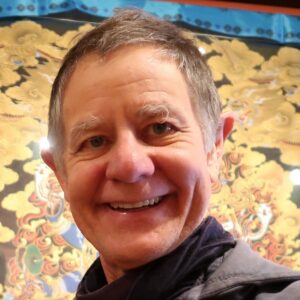
David E. Presti, "Bridging Worldviews through Collaborative Conversation: Expanding a Science of Mind"
Much attention has been given to dialogues that have taken place between the Dalai Lama and scientists over the past forty years. These conversations have developed largely from the perspective of Western science and have thus far not much engaged topics that challenge the limitations of the Western explanatory framework. Many such challenging topics are central to Buddhist culture – among them death, rebirth, and ways that what we call mind transcend the Western understanding of the physical body.
In order to expand these dialogues, the Dalai Lama some 25 years ago suggested creating science-education programs in Buddhist monasteries and nunneries in India. This ambitious project has achieved remarkable success over the years, resulting in many new monastic contributors to the science-Buddhism interaction, and seeding future generations of Buddhist scholars and practitioners who can serve the continued flourishing of collaborative conversation between Buddhism and science. This expanded interaction is already addressing both the elegant explanatory strengths of Western science, as well as the fundamental assumptions that seriously constrain its capacity to address issues related to the topics of mind and reality.
David Presti is a professor of neuroscience at the University of California, Berkeley, where he has taught biology and psychology for more than 30 years. For the past two decades he has also been engaged in dialogue and education on science with Tibetan Buddhist monastic communities in India, Nepal, and Bhutan. He is author of the books Foundational Concepts in Neuroscience: A Brain-Mind Odyssey (2016) and Mind Beyond Brain: Buddhism, Science, and the Paranormal (2018), and of the public-education edX course Psychedelics and the Mind (2023).
Wednesday, May 15, 3-4:30pm PDT (online only)
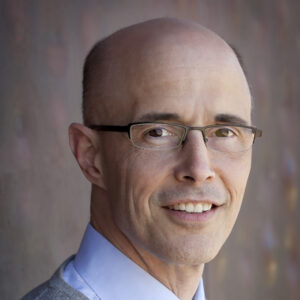
Jim B. Tucker, M.D., "Children Who Remember Previous Lives"
Researchers at the University of Virginia have investigated children’s reports of memories of previous lives for the past sixty years, studying more than 2,500 cases from around the world. In many of these, a deceased individual has been identified whose life matches the details given by the child.
Common features in the cases include a child talking about a past life at a very early age, behaviors that appear connected to that life such as phobias related to the mode of death, and sometimes even birthmarks or birth defects that correspond to wounds the previous person suffered.
The presentation will include a review of the research along with stories of individual cases.
Jim B. Tucker, M.D. is the Bonner-Lowry Professor of Psychiatry and Neurobehavioral Sciences at the University of Virginia. He is Director of the UVA Division of Perceptual Studies, where he is continuing the work of Ian Stevenson with children who report memories of previous lives. He is the author of Before: Children’s Memories of Previous Lives, a 2-in-1 edition of his books Life Before Life and Return to Life, which together have been translated into twenty languages. A child psychiatrist, he is also the director of the UVA Child and Adolescent Psychiatry training program.
Saturday, May 18, 3:30-5pm PDT (in-person & online)
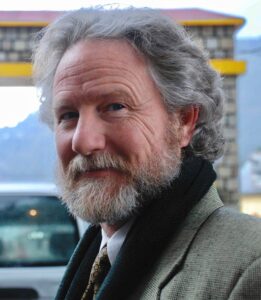
Stephen Jenkins, "Buddhist Stairways to Heaven"
The vast majority of lay and monastic Buddhists, including great figures like Buddhaghosa and Xuanzang, did not expect to achieve liberation, but instead aspired to heavenly rebirth. The “dharmalogical heavens” and related beliefs and practices provided precedents and competition for pure lands. Angelic Devatā are the blessed dead who ascend, never to fall, to pure heavens of bliss, radiance, and super-longevity ideal for receiving Dharma. Buddhists pursue heaven through a broad range of practices and as standard outcomes of the jhānas. The academic view that such rebirth is mistaken is an error belied by the host of Buddhist saints considered to abide there and by standard Buddhist teachings. Heavenly rebirth offers a robust soteriology with a proximate goal motivating entire civilizations, rather than just an elite group of ascetics. This aspect of belief and practice , which sustained Buddhism for millennia, is threatened by modernist rejections of karmic rebirth and cosmology.
Saturday & Sunday, May 18 -19 (in-person & online)
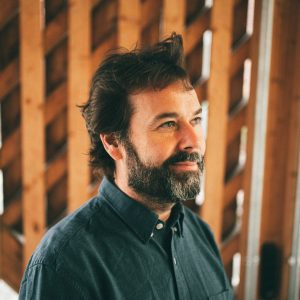
Donagh Coleman, "Dying & Postmortem Tukdam Meditation: Tibetan Buddhist and Biomedical Perspectives"
In the postmortem meditative state of tukdam, deceased meditators show no signs of death for days or even weeks. Juxtaposing ground-breaking scientific research and Tibetan Buddhist perspectives, the feature documentary, Tukdam: Between Worlds challenges our notions of life and death, and where we draw the line between them. Join award-winning filmmaker and researcher, Donagh Coleman for a screening of this major international co-production, followed by discussion of his medical anthropological PhD research and the challenges of presenting non-Western knowledge, bodies, and death processes in scientific terms and contemporary media environments. Donagh will also share precious footage that did not make the film, including interviews with leading Tibetan Buddhist teachers from different traditions.
Saturday, 6-8:30pm PDT – Screening of the documentary film, Tukdam: Between Worlds followed by discussion with Donagh. (Please note that the screening will be in-person only. Participants attending remotely can rent the movie here. The film is also available on Amazon, iTunes, Google Play, and Vimeo. The discussion will begin at 7:40pm PDT.)
Sunday, 10-11:30am PDT– This session will delve more deeply into comparative perspectives on death, dying, and tukdam, and address challenges in translating Buddhist theories and practices on these topics into scientific terms, and making different cultural worldviews visible in the media.
Sunday, 1:30-3pm PDT – Over some seven years, much footage was shot for Tukdam and Donagh’s medical anthropological PhD research that did not make the final cut of the documentary. This session will cater especially to Buddhist interests as Donagh shares previously unseen scenes and interviews with major Rinpoches, Geshes, Kenpos, Lamas, scholars, practitioners, and tukdam witnesses on issues around tukdam, death, and consciousness. Interviews will also highlight some differences between Tibetan Buddhist traditions in their accounts of tukdam and related phenomena.
Donagh Coleman is a Finnish-Irish-American filmmaker and scholar. Previous award-winning documentaries with international festival and TV exposure include Stone Pastures and A Gesar Bard’s Tale. Donagh’s films have been shown by the European Commission and museums such as MoMA and the Rubin Museum in NYC. Donagh is currently pursuing a PhD in medical anthropology at UC Berkeley, continuing research conducted for his 2022 feature documentary on Tibetan Buddhist tukdam deaths. He holds degrees in Philosophy and Psychology and Music and Media Technologies from Trinity College Dublin, as well as a master’s in Asian Studies from UC Berkeley.
Monday, May 20, 4-5:30pm PDT (online only)
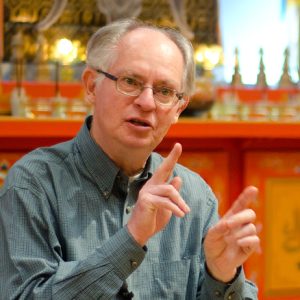
Roger Jackson, "Rebirth: Then and Now"
Rebirth, or reincarnation, was assumed by most premodern Buddhists – and is believed by many modern Buddhists – to be “the way things are” for sentient beings in the cosmos: we have lived before, and likely we will live again. Combining lecture, conversation, and audience Q & A, this session will, in broad strokes, situate the Buddhist idea of rebirth within world and Asian cultures; analyze the historical Buddha’s attitude toward rebirth; describe the realms of rebirth, the causes and conditions of rebirth, and the relation between karma and rebirth; consider traditional arguments in favor of rebirth; and describe and reflect upon the place of rebirth within modern Buddhism.
Roger Jackson is John W. Nason Professor of Asian Studies and Religion, Emeritus, at Carleton College, where he taught the religions of South Asia and Tibet for three decades. His scholarly interests include Indian and Tibetan Buddhist systems of philosophy, meditation, and ritual; Buddhist religious poetry; the study of mysticism; religion in Sri Lanka; and the contours of modern Buddhist thought. He is the author of many articles and reviews, as well as eleven books, including, most recently, Rebirth: A Guide to Mind, Karma, and Cosmos in the Buddhist World (Shambhala, 2022).
Thursday, May 23, 5-6:30pm PDT (in-person & online)
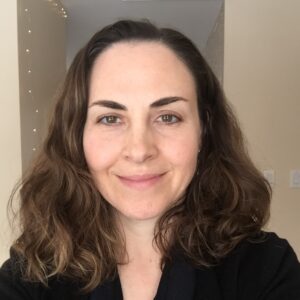
Karin Meyers, "Karma, Death, & Rebirth: Against Naturalizing Buddhism"
In the study and practice of Buddhism in the West, attempts are often made to “naturalize” Buddhism, that is, to bring Buddhist ideas about karma and rebirth into alignment with culturally specific, modern and scientific ideas about the “natural.” While this has some practical virtues, it is is often motivated by the assumption that consciousness depends on the brain and body and so must necessarily end with the death of the body. However, as we are exploring in this series of conversations on “Mind, Death, and Rebirth,” there are phenomena (such as children who remember previous lives, near-death experiences, and tukdam) that suggest consciousness may exist beyond the brain and body. This talk will reflect on how we can make sense of these phenomena in light of traditional Buddhist views, as well as how some aspect of traditional views may be challenged by diversity of experiences surrounding death and rebirth across cultures.
Karin Meyers is Academic Director of Mangalam Research Center. She received a PhD with distinction from The University of Chicago for her dissertation on free will in light of Buddhist theories of karma and causation. She has taught Buddhist studies at several colleges and universities in the US and abroad, including Rangjung Yeshe Institute in Nepal, where she directed the masters program in Buddhist Studies. Karin’s scholarly work focuses on bringing Buddhist perspectives to bear on cross-cultural and interdisciplinary inquiry into fundamental metaphysical, epistemological, and ethical questions. Her most recent work focuses on Buddhist contemplative practices, Buddhism and the imagination, as well as ecologically engaged Buddhism. She co-directed the 2022 NEH Summer Institute, “The Imagination and Imaginal Worlds in the Mirror of Buddhism,” hosted at Mangalam, and is currently editing a book on the topic for Mangalam Press.
Sunday, May 26 - After Death Journeys (in-person & online)
2-3:30pm PDT (in-person & online*)
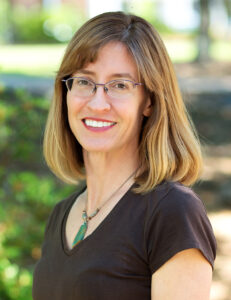
Alyson Prude, "Lives, Deaths, & Exceptions to the Rules"
Tibetan language accounts of returns from death identify delogs (‘das log) as people who have died, usually uneventfully, and then reawakened to resume their former lives. What are these people like, these delogs who have seen the afterlife? What do they say about their death experiences? I will draw from my ethnographic research with contemporary delogs to describe common features of delog testimonies as well as significant variations between individual delogs’ reports. I will also explain how delogs are viewed by their communities: what contributes to people trusting, doubting, or discrediting delogs and their messages?
*Alyson will be joining via Zoom, but you are welcome to join us in person for her talk and the following talk by Gregory Shushan.
Alyson Prude is Associate Professor of Religious Studies at Georgia Southern University where she teaches courses introducing students to Religious Studies and Asian religions. Her research focuses on issues of power and authority, relationships between normative Buddhist and indigenous traditions, and contemporary delogs in Nepal and Tibet. Her publications include “What Makes Folk Buddhism?” (Living Folk Religions, 2023) and “A Reexamination of Marginal Religious Specialists: Himalayan Messengers from the Dead” (Journal of the American Academy of Religion, 2020). She received her Ph.D. from the University of California, Santa Barbara.
4-5:30pm PDT (in-person & online)
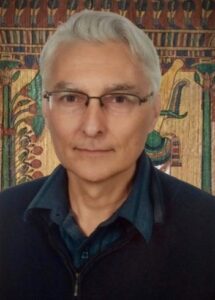
Gregory Shushan, "Culture, Religion, and Near-Death Experience: A Historical Perspective"
In this talk, award-winning author Gregory Shushan, PhD, will review his decades-long research into the historical, cultural, and religious dimensions of near-death experiences. Shushan reveals the symbiotic relationship between such experiences and beliefs about an afterlife, exploring and explaining both differences and similarities across cultures. As parallels, mediumistic descriptions of the afterlife are also considered, alongside memories of between-life states in children who claim to remember past lives. While Shushan frames his research within the history of religions, his findings have profound implications for the possibility of an actual afterlife and what it could be like.
Gregory Shushan, PhD, is the author of The Next World: Extraordinary Experiences of the Afterlife, Near-Death Experiences in Indigenous Religions, and Near-Death Experience in Ancient Civilizations (forthcoming later this year), and editor of Mind Dust and White Crows: The Psychical Research of William James. He is a historian of religions with degrees in Egyptian Archaeology, Eastern Mediterranean Archaeology, Research Methods in the Humanities, and Religious Studies. Dr Shushan is a Visiting Research Fellow at University of Winchester’s Centre for Death, Religion and Culture, an Adjunct Professor in Thanatology at Marian University, a Research Fellow of the Parapsychology Foundation, and candidate for a second PhD at Birmingham Newman University, with a project entitled, To Die and Rise Again: Near-Death Experience in Classical Antiquity. He is also the founder and commissioning editor of Afterworlds Press, an imprint of White Crow Books.
Wednesday, June 12, 12-1:30pm (online only)
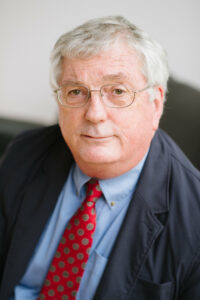
Edward F. Kelly, "Physicalism Must Go: Toward Reducing the Unwarranted Influence of Physicalism on Religious Studies"
Edward F. Kelly is an experimental psychologist and neuroscientist by training, but over the past 30 years he has had numerous opportunities to interact with scholars of religion, mostly in connection with the Esalen fellowship that resulted in Irreducible Mind (2007), Beyond Physicalism (2015) and Consciousness Unbound (2021). Those interactions showed him how deeply and destructively the currently prevailing science-based worldview known as “physicalism” has colonized the humanities in general, and to his surprise even religious studies, where its impact on the subject matter is perhaps most immediate and direct, and almost invariably hostile to traditional beliefs. The main purpose of this talk will be to explain why the physicalist worldview is in fact collapsing and no longer deserves to be presumed correct by scholars of religion. Nor can physicalists claim that theirs is the only game in town: Scientifically and philosophically respectable alternatives to physicalism are already in play, with more steadily emerging, and these are in general far more hospitable than physicalism to spiritual experiences and truth-claims of the sorts associated with traditional religions.
Edward F. Kelly is a Professor in the Division of Perceptual Studies (DOPS) at UVA. He received his Ph.D. in psycholinguistics/cognitive science from Harvard in 1971, and spent the next 15-plus years working mainly in experimental parapsychology, followed by a similar stint with a large neuroscience group at UNC-Chapel Hill where he carried out EEG and fMRI studies of human cortical adaptation to natural tactile stimuli. He returned full-time to psychical research in 2002, serving as lead author of Irreducible Mind (2007), Beyond Physicalism (2015), and Consciousness Unbound (2021), all produced under the auspices of Esalen Institute’s Center for Theory and Research. He is now returning to his central research interest – functional neuroimaging studies of psi and altered states in exceptional subjects.

